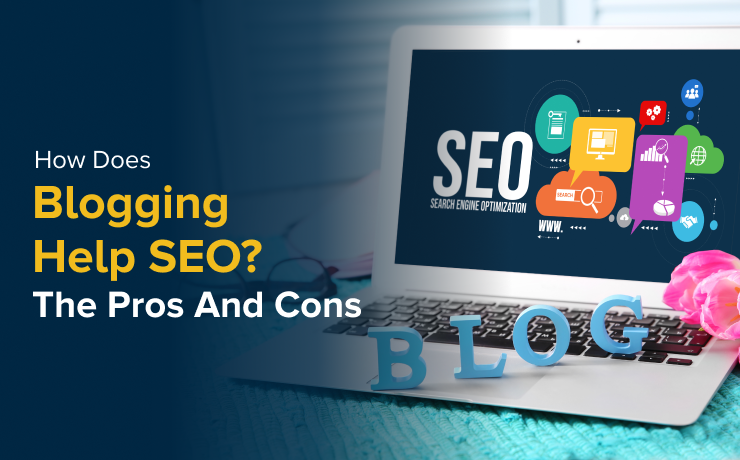
Where content is king, one might wonder, “Does blogging help SEO?” The answer is a resounding yes, but it’s not without its nuances. Blogging can significantly impact your website’s search engine optimization (SEO), driving traffic, enhancing visibility, and establishing authority in your niche. However, it requires a strategic approach, dedication, and understanding of its potential drawbacks.
In this article, we will explore the multifaceted role of blogging in SEO marketing, its benefits, and its challenges, providing you with a comprehensive understanding to navigate this digital marketing strategy effectively.
The Power of Blogging for SEO
Blogging significantly boosts SEO by enhancing keyword strategies, site structure, and engagement. Regular, quality posts increase indexed pages, improving visibility. Blogs foster backlinks, crucial for SEO, by offering valuable content. This dynamic combination drives organic traffic, elevates search rankings, and establishes online authority.
Boosting Keyword Strategy
Blogging offers an excellent opportunity to incorporate a wide range of keywords that are relevant to your target audience. By creating quality content that addresses the queries and needs of your audience, you can naturally include keywords without resorting to stuffing. This not only enhances your site’s visibility for those specific terms but also improves the overall user experience, as the content is informative and directly answers the readers’ questions.
Enhancing Site Structure
Regularly adding new blog posts to your website contributes to a more complex site structure with a greater number of internal links. This structure allows search engines to crawl your site more effectively, understanding the hierarchy and relevance of your content. Furthermore, well-organized blogs with categories and tags help users navigate your site more efficiently, leading to longer visit durations and lower bounce rates, both of which positively impact your SEO rankings.
Increasing Page Indexing
The more content you publish, the more pages from your site get indexed in search engines. This doesn’t necessarily mean that more content always equals higher traffic, but it does give your site more opportunities to be found. Each blog post is a new page that can rank for specific keywords, thereby increasing your visibility and potential to attract organic traffic.
Improving Engagement Metrics
Engaging, high-quality blog content can significantly increase the time visitors spend on your site. This is a key indicator for search engines that your site provides valuable content, which can positively influence your rankings. Additionally, interactive elements like comments and social media shares further signal that your content is engaging and valuable to your audience.
Building Backlinks
One of the most significant advantages of blogging is the potential to earn backlinks from other reputable sites. High-quality, authoritative content is more likely to be referenced by other websites, which can significantly boost your site’s authority and search rankings. Backlinks are a critical component of SEO, as they signal to search engines that other sites consider your content to be valuable and trustworthy.
Navigating the Challenges of Blogging for SEO
The main challenges of blogging for SEO include the considerable time and resources needed for consistent, quality content creation. Maintaining up-to-date SEO knowledge is essential due to constantly evolving algorithms. Measuring blogging success requires understanding complex metrics, making it tricky to gauge the direct impact on SEO efforts accurately.
Time and Resource Investment
While blogging has numerous benefits for SEO, it’s not a quick fix. Creating, publishing, and promoting high-quality blog content requires a substantial investment of time and resources. This includes researching topics, writing engaging and informative posts, optimizing for SEO, and distributing your content across social media and other channels to increase visibility.
Content Quality Over Quantity
In the quest to improve SEO, there’s a temptation to prioritize quantity over quality. However, search engines like Google increasingly value high-quality, relevant content that genuinely addresses the needs and interests of users. Producing subpar content not only fails to engage readers but can also harm your SEO efforts. Balancing the frequency of posts with the quality of content is crucial for long-term success.
SEO Knowledge and Adaptability
SEO is an ever-evolving field, with search engines regularly updating their algorithms. Staying informed about these changes and understanding how to optimize your blog posts accordingly can be challenging. It requires continuous learning and adaptability to ensure your blogging efforts contribute positively to your SEO strategy.
Measuring Success
Tracking the impact of blogging on your SEO can be complex. It involves monitoring various metrics such as organic traffic, keyword rankings, backlink quality, and engagement metrics. Understanding which metrics to focus on and how to interpret them can be daunting, especially for beginners. At SmartSites, we understand the digital landscape’s complexities and the importance of a strong online presence. Our team of digital experts specializes in creating tailored strategies that help businesses like yours thrive online. With services ranging from web design and development to search engine optimization (SEO), pay-per-click (PPC) marketing, and social media management, we ensure your business not only reaches but also exceeds its digital marketing goals.
 Free
Consultation
Free
Consultation Free
Google Ads Audit
Free
Google Ads Audit








